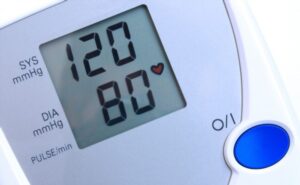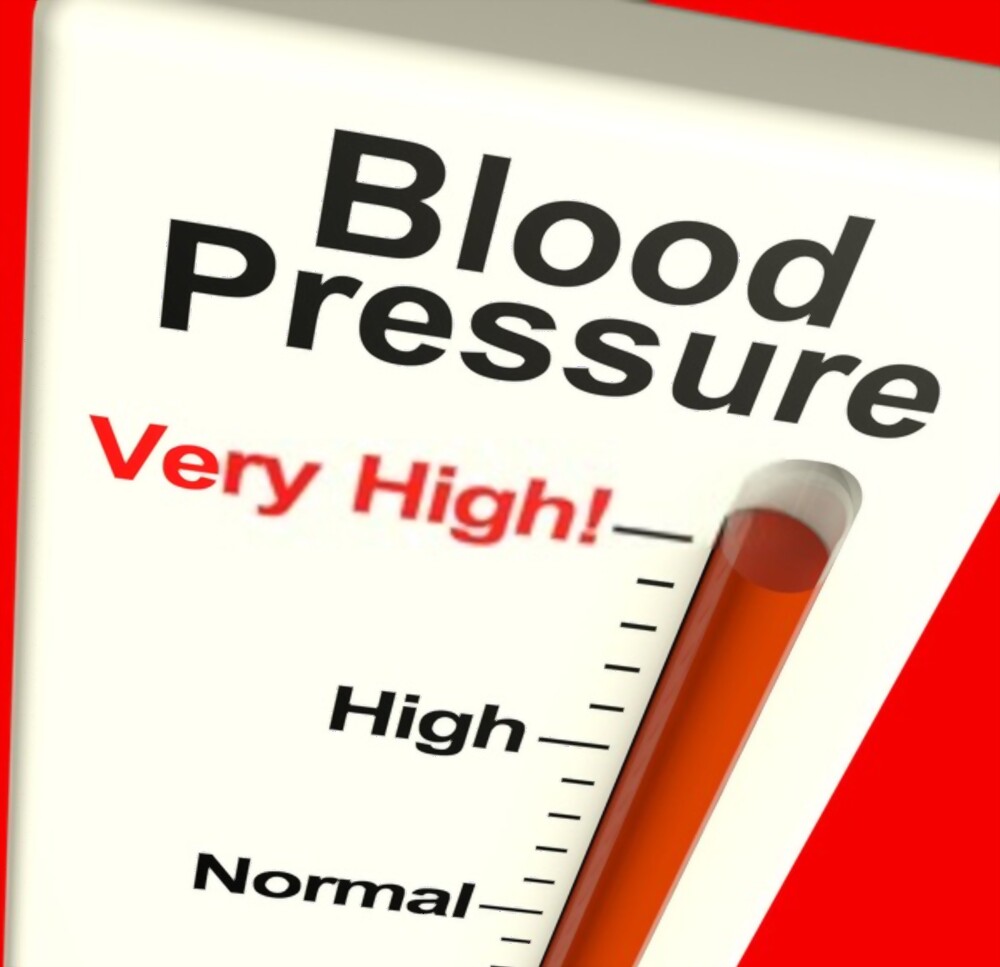High blood pressure, or hypertension, is prevalent in the world’s population, with over 1 billion people currently diagnosed. 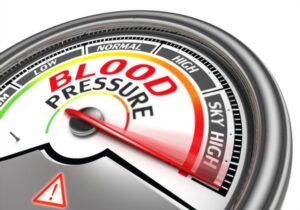 Untreated it is the major cause of heart disease – the biggest killer in the world. The irony is that it can be prevented, or at the very least reduced and brought under control.
Untreated it is the major cause of heart disease – the biggest killer in the world. The irony is that it can be prevented, or at the very least reduced and brought under control.
A normal blood pressure reading is less than 120/80 mmHg. So what does that mean? Blood pressure is the force of the circulating blood on the walls of the arteries, and is measured in units of millimeters of mercury (mmHg), using a device called a sphygmomanometer. It is measured in two parts: systolic (as the heart beats and the force is at its highest), and diastolic (between heart beats when the heart is resting and the force is at its lowest).
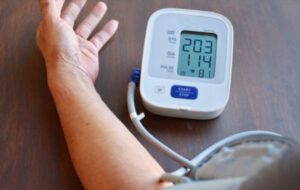 Blood pressure can change throughout the day based on your activities, but is considered high if it is continually at 130/80 or above (prehypertension). High blood pressure is defined at 140/90 or above, and a reading of 180/110, more than once, is critical and medical treatment should be sought immediately. Fear, pain or dehydration can cause a temporary increase. Some people suffer from what is known as the “white coat effect” which is an increase in blood pressure due to fear of hospital or the doctor’s clinic.
Blood pressure can change throughout the day based on your activities, but is considered high if it is continually at 130/80 or above (prehypertension). High blood pressure is defined at 140/90 or above, and a reading of 180/110, more than once, is critical and medical treatment should be sought immediately. Fear, pain or dehydration can cause a temporary increase. Some people suffer from what is known as the “white coat effect” which is an increase in blood pressure due to fear of hospital or the doctor’s clinic.
Regular blood pressure testing is important since most people do not exhibit symptoms of hypertension until the blood pressure has reached dangerously high levels, and for this reason it is sometimes referred to as “The Silent Assassin.” Symptoms can include: headaches, nosebleeds, roaring in the ears, irregular heartbeat or heart palpitations, shortness of breath, blood in the urine, unjustified sweats, fatigue or confusion.
Lifestyle, age, genetic susceptibility, diet, medicines and medical conditions can all contribute to high blood pressure, with examples being: lack of physical exercise, regular tobacco use or drinking too much alcohol; stress; long-term sleep deprivation; older age (the risk of developing high blood pressure increases with age); a family history of hypertension (particularly parents); race (being of African or Caribbean descent); being overweight or obese; a diet high in salt, fat or cholesterol; medical conditions such as kidney or hormone abdomolities and diseases; diabetes; high cholesterol; some medications including birth control pills. Whilst men are more at risk in their earlier adult years, the risk is higher for women over the age of 55.
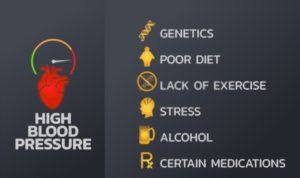 High blood pressure puts an immense strain on the heart, blood vessels and kidneys, and conditions related to high blood pressure include: heart attack, stroke, aneurysm, heart disease, kidney disease, diabetes, metabolic syndrome, thickened, narrowed or torn blood vessels in the eyes; and dementia.
High blood pressure puts an immense strain on the heart, blood vessels and kidneys, and conditions related to high blood pressure include: heart attack, stroke, aneurysm, heart disease, kidney disease, diabetes, metabolic syndrome, thickened, narrowed or torn blood vessels in the eyes; and dementia.
If high blood pressure is caused by lifestyle, there are steps that can be taken to reduce the risk including: maintaining a healthy weight, eating a healthy diet and reducing salt, fat and cholesterol intake (salt encourages the kidneys to retain more water, which in turn raises blood pressure – beware that extra salt is often hidden in processed foods and ready-made meals or takeaways), exercising regularly, stopping smoking, drinking alcohol in moderation, and managing stress levels. 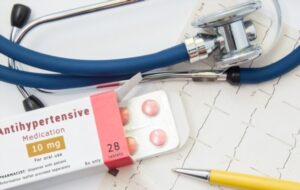 If the cause is a side effect of other medication, then a doctor may be able prescribe another medication, or if the underlying cause is currently untreated, such as diabetes, steps should be taken to manage this better. If these steps are not sufficient to lower the blood pressure to an acceptable level, antihypertensive medication such as calcium channel blockers, aka calcium antagonists, may be prescribed which will probably need to be taken for life. Regular blood pressure checks are essential.
If the cause is a side effect of other medication, then a doctor may be able prescribe another medication, or if the underlying cause is currently untreated, such as diabetes, steps should be taken to manage this better. If these steps are not sufficient to lower the blood pressure to an acceptable level, antihypertensive medication such as calcium channel blockers, aka calcium antagonists, may be prescribed which will probably need to be taken for life. Regular blood pressure checks are essential.
Meanwhile, there are several natural methods of helping to reduce your blood pressure and bring it under control, without any of the side effects associated with synthetic medication, and whilst supporting your health with a plethora of other benefits at the same time:
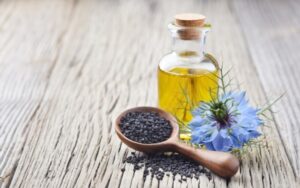 Black Seed Oil
Black Seed Oil
Black seed oil is a traditional herbal remedy for high blood pressure, and research has supported its effectiveness. Published in the Journal of Hypertension, one research study assessed the evidence from 11 separate clinical trials which comprised of 860 participants, including both healthy patients and those with hypertension. The overall reduction in blood pressure, compared to the placebo was 3.26/2.80, but on further investigation, the reduction of those suffering from hypertension was 7.66/4.89 after eight weeks. Imagine what a difference that could make combined with a new healthier lifestyle!
It is not fully understood how black seed reduces blood pressure, but theories include that it has a relaxant effect on the smooth muscles, may dilate blood vessels in a similar fashion to calcium channel blockers, may improve the efficiency of the heart pumping, or is the result of its diuretic properties. Black seed is also known to have powerful anti-inflammatory properties, and contains omega-3 which is confirmed to have a beneficial effect on hypertension.
Furthermore black seed is also proven to lower “bad” LDL cholesterol levels (as demonstrated in the research mentioned above), and animal studies showed improved recovery of damaged heart tissue (following heart surgery or treatment after a heart attack), and another indicated increased heart blood flow and new blood vessels – all helping to improve cardiovascular health.
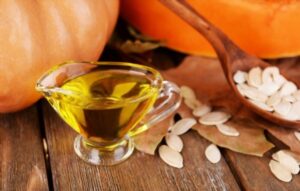 Pumpkin Seed Oil
Pumpkin Seed Oil
The nutrients in pumpkin seed oil are what makes this a winner for hypertension. It’s bursting with heart-healthy compounds such as antioxidants, magnesium, potassium, fatty acids, and arginine.
The presence of arginine, an amino acid which increases nitric oxide, makes it a natural vasodilator, meaning it relaxes blood vessels, allowing them to widen, thus improving blood flow and reducing blood pressure.
Potassium helps to regulate blood pressure by counteracting the adverse effects of sodium. Research shows that low levels of potassium increase blood pressure, whilst high levels can prevent and reduce high blood pressure.
Magnesium allows the blood vessels to react by acting as a calcium channel blocker and stopping calcium from entering the cells of the heart and arteries. A deficiency of magnesium causes the walls of the arteries and capillaries to constrict, increasing blood pressure.
Fatty acids help to reduce inflammation and decrease levels of compounds called oxylipins which restrict blood vessels. As a further heart benefit, pumpkin seed oil also lowers levels of “bad” LDL cholesterol.
The presence of phytoestrogens in pumpkin seed oil, which have an estrogen effect, makes it suitable for lowering high blood pressure in postmenopausal women. A blind study of 23 women over a six week period which was carried out by researchers Marymount University, in Arlington, Virginia, USA, found that they had a significantly reduced systolic blood pressure, in addition to better blood flow in their arteries, which led them to conclude that pumpkin seed oil “might be effective in the prevention and treatment of hypertension in this population”.
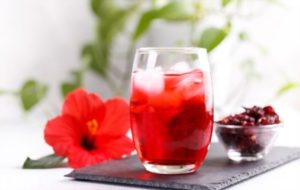 Karkade (Hibiscus) Tea
Karkade (Hibiscus) Tea
Karkade tea has long been touted for its ability to lower high blood pressure, and hibiscus is one the most extensively studied plants in regard to its antihypertensive properties.With its diuretic action it can flush excess fluid and sodium from the body. Karkade is also a natural vasodilator, the anthocyanins and other antioxidants which it contains help to improve elasticity of the blood vessels and their ability to dilate, allowing them to resist damage that can cause them to narrow.
Research has shown that karkade tea acts in a similar way to angiotensin-converting enzyme (ACE) inhibitors, helping to relax the veins and arteries. Studies to date include: A mexican study with 75 participants with hypertension, who were treated with either karkade tea or a commonly prescribed hypertension drug for 4 weeks. At the end of the study both groups showed a reduction of blood pressure by 15.32/ 11.29 mmHg on average, or approximately 11%;
A study involving 171 people with hypertension treated one group with an ACE inhibitor drug and another with karkade tea. The blood pressure of those on medication fell by 23.31/15.39mHg, compared to 17.14/11.97 mmHg for those on karkade tea. Although the medication did decrease blood pressure more, the results for the tea were very impressive, with no side effects, and with additional health benefits imparted by the tea. Blood tests confirmed natural ACE inhibition within the tea;
A study with 75 participants with mild to moderate hypertension were given either hypertension medication, karkade tea or a placebo for four weeks, and it was found that blood pressure fell significantly with both the medication and karkade tea, but the tea actually outperformed the medication, causing the greatest decrease;
A study of 60 people with both type-2 diabetes and untreated hypertension were given either black tea or karkade tea to drink twice a day for one month. While the hypertension increased with the black tea, blood pressure decreased by an amazing 21.7/1.1 mmHg with karkade tea.
To get the full benefits from karkade tea it is necessary to steep it for at least six minutes, cool and enjoy the refreshing tart taste (add honey to sweeten if preferred). The recommended intake is three cups a day. Furthermore, the tea has additional benefits for the cardiovascular system, as it may also stabilise cholesterol and blood glucose levels.
Aromatherapy can also help to control stress levels and thus impact on hypertension. A London hospital has made long-term studies on the effect of aromatherapy on hypertension and have concluded that an aromatherapy massage reduces high blood pressure and the effect remains for several days.
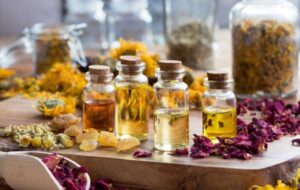 Try Lavender (calming properties that may reduce anxiety and heart rate), Ylang-Ylang (decrease levels of cortisol, and thus lower blood pressure), Bergamot (lower heart rate and blood pressure), Cedarwood (promote relaxation and decrease heart rate temporarily), Frankincense (reduce stress levels and regulate the heart), Rose (relax the entire body to increase blood circulation and lower high blood pressure), Jasmine (relax a tense nervous system), or Lemon (relieve stress and depression, lowering blood pressure).
Try Lavender (calming properties that may reduce anxiety and heart rate), Ylang-Ylang (decrease levels of cortisol, and thus lower blood pressure), Bergamot (lower heart rate and blood pressure), Cedarwood (promote relaxation and decrease heart rate temporarily), Frankincense (reduce stress levels and regulate the heart), Rose (relax the entire body to increase blood circulation and lower high blood pressure), Jasmine (relax a tense nervous system), or Lemon (relieve stress and depression, lowering blood pressure).
A blend of Lavender, Ylang-Ylang and Bergamot is said to be particularly effective, and has produced results of an average blood pressure reduction of 12/4 mmHg. Make your blend based on your own particular needs, or use them individually. A regular massage is key, but you can utilise the aromatherapy effects with a diffuser or an aromatherapy bath for relaxation in-between sessions.
Remember that essential oils should never be applied undiluted to the skin but should be added to a carrier oil such as jojoba, sweet almond or coconut.
Overall hypertension is controllable but it takes a lifetime commitment. Don’t become another statistic, make those changes today, and stop hypertension before it stops you!
